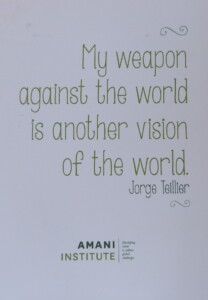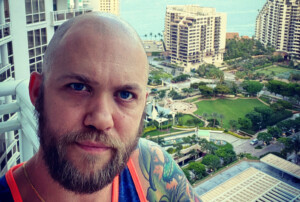
“When it comes to action” he said, “you have to think about building a team, partnerships, testing your idea, developing your business, a business model, raising funds, creating an advisory board and a board of directors or scaling your work…” James gets nods of agreement from the rest of the Fellows, some offered additional points to consider.
All of them had shared ideas of what is needed at each point of the framework underlying the course we call the ‘Inner Journey of the Changemaker’ at Amani Institute. I took a deep breath. This was my fourth year facilitating the course and each time this is the moment when I get excited because this is where things get real.
It’s not difficult to think of the elements needed to start, build and grow a social enterprise. What we usually come to think of way later, when we are in the midst of what they call ‘baptism by fire,’ is how we as a person affect the outcomes of all the above. To a large extent, our work stands and falls with ourselves.
 Building a team – how do you choose the right people? How do the ways you have come to learn to communicate, resolve conflicts and navigate people’s strengths, and weaknesses affect the outcomes of your work? How does your weak follow-up game affect your partnerships? Or are you too eager? How does your fear that they might not like your work, or worse, yourself, affect your communication and strategy with them? What about your relationship to hearing ‘No’ and general rejection?
Building a team – how do you choose the right people? How do the ways you have come to learn to communicate, resolve conflicts and navigate people’s strengths, and weaknesses affect the outcomes of your work? How does your weak follow-up game affect your partnerships? Or are you too eager? How does your fear that they might not like your work, or worse, yourself, affect your communication and strategy with them? What about your relationship to hearing ‘No’ and general rejection?
How does your fear that your idea may not be that good affect your prototyping? Or maybe you don’t have fears but are overtly confident and don’t know it, but you are a terrible listener, and your design thinking prototype sucked and just served to check a box but didn’t provide you actual information to co-create a solution to the problem you want to address?
What about developing the business? Are you prioritizing things right? Wait, did you already burn out? Do you know how to sustain your health, relationships, and family while pursuing that dream of change?
What about your relationship with money? Do you know how to understand potential funders and how your story connects with their desires? Did you learn how to pitch but you still find 1001 reasons to procrastinate building the pipeline? Do you over-promise? Do you sleep at night?
Do you have the courage to ask the right people to join your advisory board or board of directors? Do you know when is the right moment to ask them? Are you self-deprecating or too pushy? Do you know how to listen?
“The quality of your work, no matter as an entrepreneur or as an intrapreneur, depends on how you can navigate yourself and grow into who you truly want to become.”
Do you know yourself? Do you know that changing the world requires changing yourself?
Looking at James and the 18 other Fellows from 10 different countries and incredibly diverse backgrounds, I said: ‘Welcome to the Inner Journey of the Changemaker. In this course, we will explore what it takes to unlock your potential and sustain your work in the long run. To every external aspect of our work is an inner aspect that is determined by our story and who we have become. The quality of your work, no matter as an entrepreneur or as an intrapreneur, depends on how you can navigate yourself and grow into who you truly want to become.’
It blows my mind that we still don’t have curricula in mainstream education – from Kindergarten to University – that take advantage of the vast knowledge out there on how to unlock our potential, become more resilient and flexible in how we communicate and resolve conflicts, instead of depending on replicating our families’ and communities’ patterns. There is a reason we have a multi-billion dollar coaching – and therapy – industry.
In this ongoing column, I will share insights we have gathered at Amani Institute teaching ‘the Inner Journey of the Changemaker’ which is an integral part of our Postgraduate Certificate in Social Innovation Management aimed at helping people to build careers of meaning and impact.
Next, I will explore the issue of passion and purpose and how understanding your true north can set the direction and impact of the change you want to create.
Put yourself out there and do work that creates value for people and the planet with the skills you already have: This is an instant recipe for meaning.
Moment of Obligation
“I do this because when I got raped and when I got my diagnosis, I wished there was a safe space where people had shared their narratives that I could tap into and get the strength to move forward.” Sitawa Wafula, Amani Institute alumni and New Voices Fellow at Aspen Institute, shares her personal story as a rape survivor and mental health diagnosis as part of her work championing Mental Health in Africa and beyond through ‘My Mind My Funk’ – a information and support hub located in Kenya.
In her story, she didn’t really see any other option but create a solution for something she needed – her life’s purpose revealed itself in her greatest struggle.
Stories like this carry immense power in their vulnerability and in how they show how the medicine you create for your wounds sometimes can become your biggest gift to the world. However – not all Changemakers have such stories or are aware of the power of their own.
In a world of which we speak a lot about passion, more and more people are asking how they can connect this to purpose. A reason to get out of your bed every morning that is larger than yourself.
I work with people who are looking to switch their career from the private to the social change sector as well as professionals who have hit a wall in their work as a social entrepreneur or NGO employee or students who know that they ‘want to change the world’ but are not sure yet really how.
There are two reasons why better understanding your underlying motifs and the values that guide them is relevant for you as a Changemaker:
- There are many, many, many challenges – and tackling them is incredibly challenging. So, first of all, if you get lost in the jungle of options, it helps to know what is most important to you to make decisions.
- And secondly, of you get tired and lose all hope it helps to remember why you are doing this to refuel and recover.
So you need both – a guiding star and an anchor. You need your vision and your why. In his book “Sharing Wisdom From Over 125 Outstanding Leaders”, acclaimed former Medtronic CEO Bill George calls this the ‘True North.’
One thing we can learn from people who have a track record in sustaining a career in creating social change is that they are deeply aligned with their ‘why.’
One of our instructors, Jerry White, who is known for leading high-impact campaigns including the historic International Campaign to Ban Landmines that won a Peace Nobel Prize in 1997, points out that most social entrepreneurs are very clear about what they want to do and how they are going to do it but not why.
Why you do it is an inquiry into who you are, something that in philosophy and wisdom scriptures all over the world is at the core of transformational leadership narratives. He claims that if we use technical solutions in a knowledge-based approach, we often create more damage than good and miss a wiser approach that arises when we are aligned with our ‘True North.’
Watch him speak about this in detail in this video taken during an Ashoka Fellowship Program:
Not every story is as seemingly clear-cut as Sitawa’s. Some people have a single transformative moment; others have a feeling it has always been in their cards to do what they do, and others have more of a slow burning that reveals itself over time in the conviction that a fulfilling life includes answering the question what the world needs from them.
For those who are desperately looking to find a name for their purpose, I strongly recommend to taking the pressure off the Quest. As Dr. Vincent Ogutu, Vice Dean Executive Talent Development at Kenya’s Strathmore Business School shared with our Fellows at Amani Institute: Put yourself out there and do work that creates value for people and the planet with the skills you already have: This is an instant recipe for meaning. You may stumble over your deeper ‘why’ in the process, as he did when doing an impromptu speaking engagement in a prison – but you don’t need to have it to start doing meaningful work.
Ways of inquiring your moment(s) of obligation include identifying your values and vision through biographic work or looking into what we call the ‘wound-gift’ concept. You can do it by yourself or with a mentor or coach. In any case it is a process of inquiry that needs your engagement with the world to fully reveal itself – reflection alone doesn’t cut it.
This article was originally published in two part for issue 4 and 5 of Change Creator magazine by Geraldine Hepp of the Amani Institute.






